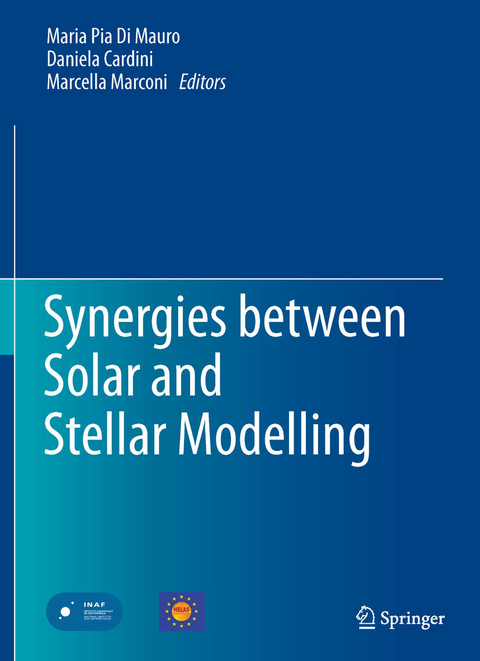
Synergies between Solar and Stellar Modelling
Springer (Verlag)
978-94-007-8975-3 (ISBN)
ThisvolumeisacollectionofarticlesoriginallypublishedonaSpecialIssueoftheAstrophysicsandSpaceScienceJournal. It is intended to give a comprehensive overview of the current state of knowledge in solar and stellar modelling, with the aim of comparing and extending what we know from the detailed solar modelling, made possible by the helioseismic tools and by the recent analysis of the solar spectrum, to the modelling and understanding of generic stellar structures and their evolution. Particular emphasis is devoted to the role of the input physics, and its relevant uncertainties, in the construction of stellar models and in the resulting predictions for general observable quantities. Issues related to convection, overshoot, diffusion and settling of helium and heavy elements, rotation, chemical composition and magnetic eld are extensively discussed. Large space is dedicated to the application of helio- and asteroseismic techniques as tools to prove the theory of the evolution and the structure of the stars. Comments on prospects for future improvements and re nements of the theoretical models are given, focusing on the possibility of getting ever more precise helioseismic and asteroseismic observations from ground and space. The articles included in this volume are the results of the HELAS-NA5 workshop ‘Synergies between solar and stellar modelling’ held in Rome from 22nd to 26th of June 2009, which was an unique occasion to gather the solar and the stellar physics communities to discuss the urgent questions risen by recent photometric and spectroscopic observational results.
Asteroseismology of solar and stellar models.- New results on standard solar models.- Low heavy-element photospheric abundance: a challenge for solar modeling.- Comparisons between stellar models and reliability of the theoretical models.- Modeling the solar irradiance background via numerical simulation.- Helioseismology as a diagnostic of the solar interior.- Prospects for asteroseismology.- How asteroseismology can constrain the global parameters of solar-like star models.- Asteroseismology and the degeneracy of model solutions for subgiant stars.- Determining stellar radii using large separations: an error analysis.- The red-giant CoRoT target HR?7349.- ??Cas: a new candidate ??Cephei star. Atmospheric characterization and variability analysis.- CoRoT 102931335: a candidate ? Dor in an eclipsing binary.- A complex asteroseismic study of the hybrid B-type pulsator ? Eridani.- Asteroseismic modelling of the solar-like star ? Hydri.- Spectroscopic mode identification of main-sequence non-radially pulsating stars.- The PMS ? Scuti star PDS2.- Investigating the semi-regular light variations of the bright M5 supergiant: ? Herculis.- CoRoT observations of the young open cluster Dolidze 25.- Pulsation period changes as a tool to identify pre-zero age horizontal branch stars.- Semiconvective mixing in low-mass stars.- Sensitivity of the sub-photospheric flow fields inferred from ring-diagram analysis to the change on the solar model.- Accurate and versatile equations of state for the Sun and Sun-like stars.- Application of SAHA-S EOS to solar modeling.- Dynamic screening in solar and stellar nuclear reactions.- Charged-particle induced thermonuclear reaction rates of 3He(3He,2p)4He, 3He(4He,?)7Be and 7Be(p,?)8B by using the exact tunnelingprobability.- Effects of new nuclear reaction rates on the solar neutrino fluxes.- The role of the equation of state in models of very low-mass stars.- Elemental diffusion and segregation processes in partially ionized solar plasma.- Emulating the OPAL equation of state.- The chemical composition of the Sun.- The chemical composition of solar-type stars in comparison with that of the Sun.- The solar, exoplanet and cosmological lithium problems.- Helium and metal diffusion in the Sun and in cluster stars.- Radiative accelerations, accumulation of iron and thermohaline convection inside stars.- Convection in stellar models.- Some properties of the kinetic energy flux and dissipation in turbulent stellar convection zones.- Overshooting and semiconvection: structural changes and asteroseismic signatures.- Stellar turbulence and mode physics.- Numerical simulations of the ?-mechanism with convection.- Stochastic excitation of gravity modes in massive main-sequence stars.- New insights on the interior of solar-like pulsators thanks to CoRoT: the case of HD 49385.- Smooth models of overshooting at the base of the solar convective zone.- The solar differential rotation: a historical view.- A semi-analytic approach to angular momentum transport in stellar radiative interiors.- Effect of stellar rotation on oscillation frequencies.- 2-D models of rapidly rotating stars.- 2D solar modeling.- The butterfly diagram internal structure.- The discontinuous nature of chromospheric-activity evolution.- Future instrumentation for solar physics: a double channel MOF imager on board ASI Space Mission ADAHELI.- A new opportunity from space: PLATO mission.- Planning magneto-optical filters for the study of magnetic oscillations of the Sun.- Synthetic stellar and SSP libraries astemplates for Gaia simulations.- Differential photometry of ? Scuti stars at Maidanak observatory.- Unveiling stellar cores via their flattening.- Interpreting the solar cycle changes in p-mode velocity amplitudes as seen in Sun-as-a-star observations.- Nuclear reactions.
| Erscheint lt. Verlag | 28.10.2014 |
|---|---|
| Zusatzinfo | XVI, 257 p. |
| Verlagsort | Dordrecht |
| Sprache | englisch |
| Maße | 210 x 279 mm |
| Themenwelt | Naturwissenschaften ► Physik / Astronomie ► Astronomie / Astrophysik |
| Naturwissenschaften ► Physik / Astronomie ► Atom- / Kern- / Molekularphysik | |
| Naturwissenschaften ► Physik / Astronomie ► Hochenergiephysik / Teilchenphysik | |
| Naturwissenschaften ► Physik / Astronomie ► Thermodynamik | |
| ISBN-10 | 94-007-8975-0 / 9400789750 |
| ISBN-13 | 978-94-007-8975-3 / 9789400789753 |
| Zustand | Neuware |
| Haben Sie eine Frage zum Produkt? |
aus dem Bereich


